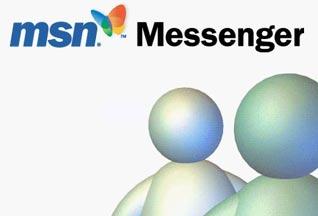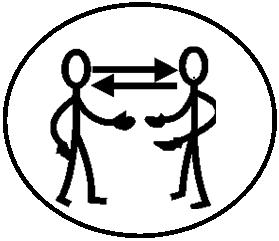Courses/Computer Science/CPSC 203/CPSC 203 2007Fall L04/CPSC 203 2007Fall L04 TermProjects/Getting through with a bad connection
Contents
- 1 Group
- 2 Project Title
- 3 Internet Technology
- 4 Initial Project Statement
- 5 Argument
- 6 Background Information
- 7 Evolution of Communication
- 8 How the Instant Messaging Effects Social Skills
- 9 Communication Barriers
- 10 Popularity Among Children-Dislike Among Parents
- 11 Conclusion
- 12 References
- 13 External Links
Group
Group Name:Decoded
Group Members: Carol Chung, Elliot Berenger, Joseph Chun
Project Title
Getting Through With a Bad Connection
Internet Technology
MSN MessengerInitial Project Statement
We plan to explore how web communication is depersonalizing our relationship with others. We will look at the history and development of online communication, its cultural influences and implications. In addition we will show how the grow reliance on web interaction is putting a wedge in modern relationships on various levels.
Argument
Web communication is depersonalizing our relationships and connections with others. It was not that long ago that we visited our neighbors daily to deliver news or just have a friendly conversation. However, throughout the advancement of communication technology, society has become increasingly dependent on speed and efficiency. Nowadays it is not unusual for people to have never met their neighbors at all. Instead, now we use things like email and instant messaging to communicate with friends, associates, and even people we have never met before.
Background Information
Instant Messaging (IM) began in the 1970s on multi-user operating systems, then on to local networks, and now it has spread across the Internet like wildfire. Today there are numerous different IM applications such as Yahoo, MSN, AOL, IBM, each with a different target audience.
Today’s teens are the most regular users of MSN Messenger and other IM services. MSN has become the primary communication tool in their relationships with friends, family and in some cases even for school. Urbandictionary.com defines MSN Messenger as “the most common teenage addiction". [[1]]
Evolution of Communication
Studies are being conducted all the time this day in age in an attempt to figure out the many fast pace changes being made. One such change was the birth of technology and the rapid growth following in which new ways of communication are always being invented.
Take for example text messaging, a recent invention in communication that is based on the same type of writing as MSN Messenger. It has exploded recently and is certainly changing the way people go about communicating. Results from a study on two groups of 11 and 12 year olds (in which Group 1 practices texting and Group 2 does not) shows that when asked to describe a picture, the Group 1 described it significantly less than the group who didn't text.
There are growing concerns because of this on the quality and expressiveness of youths writing skills.
How the Instant Messaging Effects Social Skills
Social skills are developed by face to face interactions with people, for example school, sports teams or something as simple as buying groceries. These interactions build confidence and the ability to express yourself with more than just words but also with body language, voice tones and inflections. The actual words themselves make up a measly 7% of communication.
Nowadays, the average person spends over 3 hours a day on instant messaging systems, placing it only second to Google in regards internet applications.[[2]] This time spent on MSN Messenger is taking away from the time that previously would have been used for face-to-face communication or even talking on the phone. This results in a handicap in developing social skills, which cause people to become uncomfortable with real face-to-face interactions and completely hopeless when it comes to confrontations.
MSN Messenger does not allow individuals to read each other's body language or hear their tone of voice. Both of which are things that are not taught in school or learned from a book. These skills of communication are learned through practice experience gained from simple daily conversations from the time you are born. The use of MSN Messenger is growing in popularity among younger and younger children. This means that more and more children are not getting the chance to practice the true art of conversation and develop the ability to read between the lines.
6 Main Social Skills
Robert Elliot does a good job of summarizing some of the most important social skills (below) [[3]] in our culture today. Each and every one of these skills are hindered in some way if a person uses MSN Messenger for the majority of their communication with others.
1) The ability to remain relaxed, or at a tolerable level of anxiety while in social situations
- Like mentioned above overuse of MSN Messenger can cause individuals to become uncomfortable with face-to-face conversations and interactions. This and other things will cause the individual to experience high levels of anxiety that is impossible to hide from one's body language, facial expression, and voice patterns. While a more experienced conversationalist can cover up these signs, users of MSN Messenger have not had the opportunity to develop this ability.
2) Listening skills, including letting others know you are listening, including
-Making 'I'm listening' noises - 'Uh-huh', 'really?', 'oh yes?' etc.
-Feeding back what you've heard - "So he went to the dentist? What happened?"
-Referring back to others' comments later on - "You know how you were saying earlier…"
-Physical stillness, eye contact and attentiveness while the other person is talking.
- This is also a skill that is obtained only through experience that an IMer does not get. On top of this MSN Messenger users develop a habit of talking to multiple people at once or doing other things when they are IMing contacts. The resulting shortened attention span deeply hinders their ability to actually listen to what the other person is saying let along listening attentively. The lack of this particular skill will also affect one's ability to learn and pay attention in school or at work.
3) Empathy with and interest in others' situations
- This social skill like number 2) is directly affected by the MSN Messenger user's shortened attention span. Even if the IMer can pay attention long enough to develop interest in the other person's situation they may not know how to covey it without the use of various MSN Emotion Icons.
4) The ability to build rapport
-Body posture 'mirroring', or movement 'matching'
-Reflecting back language and speech, including rate, volume, tone, and words
-Feeding back what you have heard, as in 2) above
- Rapport is a characteristic of unconscious human interaction that is an automatic response when an individual is on the same wavelength as the person or people they are talking to. These responses can be synchronized to a level that cannot be achieved consciously. Therefore this skill is another ability that is developed in the face-to-face conversations that frequent MSN Messenger users lack. They do not get to see any body posture, body language, voice rate, volume, or tone over MSN Messenger. This causes the individual to become unable to truly connect or communicate with anyone they interact with.
5) Knowing how, when and how much to talk about yourself - 'self disclosure'
- Generally a person knows when they are talking too much when their audience shows physical signs or losing interest, such as losing eye contact, lack of rapport, fidgeting or the glazing over of their eyes. Over MSN Messenger none of these hints can be observed. The only way to know the other person is no longer interested is if they actually tell you, which few people do, or if they do not respond for long periods of time. On the other hand there is no way to tell if their lack of response is because they also engaging in other conversations, if their computer froze or numerous other possibilities.
6) Appropriate eye contact
- Once again MSN Messenger does not allow its users to see each other therefore preventing eye contact of any kind. This is one of the most notice able social skills in that it is highly obvious and awkward when a parson cannot maintain appropriate eye contact. One of the most popular complaints of a person’s social skill is that they won’t look you in the eye when you are talking to them. This eye contact is essential because it lets the speaker know you are engaged, listening and at least somewhat interested. Prolonged eye contact can also cause problems in that the person you are talking to may feel challenged, like you are angry with them, or just nervous. This is a very important skill that is naturally and subconsciously fine-tuned with practice.
Furthermore, MSN Messenger enables individuals to think, prepare and change answers or replies before they are communicated, whereas in real-life situations people do not have this liberty. Thus MSN Messenger users may experience a noticeable delay in response when they are forced to have real conversations. All these things affect individuals in the future, it handicaps the individual in social interactions required for getting through life, such as in job interviews or just talking to your friends and family. In today’s fast-paced business world you cannot get ahead without a certain air of authority and confidence acquired from interaction with others.
Communication Barriers
MSN Messenger had a language of its own that has slowly incorporated itself in to the English language. Terms like lol and brb are now being spoken as well as typed. MSN Messenger is diminishing grammar and the art of conversation at an exponential rate. It is getting to be that teens cannot write a good essay for school because slang has become second nature like a wolf hunting its prey.
| MSN Slang; | Definition |
|---|---|
| LOL | Laugh Out Loud |
| BRB | Be Right Back |
| TTYL | Talk To You Later |
| BTW | By The Way |
| FYI | For Your Information |
| G2G | Got to Go |
| HW | HomeWork |
| IDK | I Don't Know |
| IMO | In My Opinion |
| JK | Just Kidding |
| NP | No Problem |
| NM | Not Much |
| SRY | SorrY |
Although you may think that the IM you are sending is clear to recipient there is much more involved in communication then the words that put together sentences. Communication involves 3 main parts the biggest being body language with 55%, the second main part is tone and voice patterns with 38%. The words that you actually say make up only 7%. [[4]]
When individuals are communicating over MSN Messenger they are only receiving a small fraction of the information needed to interpret a message’s meaning. Therefore, without body language it is impossible to truly get to know someone on a personal level. In this way, MSN Messenger is depersonalizing our relationships and driving a wedge in communication.
Over MSN messenger you are unable to see their body language or hear their tone of voice, for this reason it is easy to misinterpret the intention of the message. For example a sarcastic comment can be taken seriously and result in a dispute which would have otherwise been avoided by a sarcastic tone or facial expression. Body language is seen as the most important way and honest to communicate because you cannot easily lie about your body language. Human beings are programmed to show and express our deepest emotions through body language. When a person is lying to you, their words may be seen as normal and believable but their body language will always give them away. This may be because of a lack of eye contact, fidgeting or just a slight change in their usual behavior. An application like MSN Messenger does not allow this type of emotion to come through its messages and deeply hinders the communication processes.
Popularity Among Children-Dislike Among Parents
Youth are widely attracted to MSN Messenger mainly because they think it is fun and cool. They like it because when they have the need to be social they can just go online and there will be someone to talk to. It is also an easy way to communicate with those who live far away. The latter may be a positive attribute to parents but for the most part IMing is a worrying use to parents.
The anonymity is a major concern, as there are many cases of older people luring younger users into illegal situations. Also instant messaging can create problems among those who use it because many find that things are said which normally wouldn't be said in person. Mean and hurtful things are a lot easier to say when not face to face with the other person, this is worrying as it can also create confrontation problems in real life situations.
Another problem is that statements are often misinterpreted because of the loss of tone body language and eye contact. Some will take advantage of this. People not normally viewed as bullies in real life could easily bully online with out any sense of what is happening on the other end.
Parents and the like will usually agree that IMing is a very poor way of communication as convenient as it is, there are just too many downfalls to its use.
Conclusion
Although IM has depersonalized the way we communicate, programs such as MSN Messenger are trying to work towards a more personalized form of web communication with the existence of webcams and microphones. Even with this technology available most people do not use it because of the cost, availability and hassle. The elements of IM that we have presented represent the characteristics of MSN Messenger in our society today. These elements take part in the way we communicate as well as our development of social skills in our society.
References
- http://www.urbandictionary.com/define.php?term=msn+messenger
- http://www.educause.edu/ir/library/pdf/ELI7008.pdf
- http://en.wikipedia.org/wiki/Instant_messaging
- http://www.nielsen-netratings.com/pr/pr_070710_UK.pdf
- http://neveryetmelted.com/?cat=21
- http://www.lehsd.k12.nj.us/users/dupuis/GreatWallofChina.htm
- http://www.selfgrowth.com/articles/Van_Marwijk.html
- http://www.associatedcontent.com/article/12584/the_importance_of_body_language.html
- http://education.guardian.co.uk/schools/story/0,5500,1378951,00.html
- http://www.children-online.org/articles/IM_IssuesVol2.html
- http://www.fwzone.net/ShowDetail.asp?NewsId=12223
- http://www.children-online.org/articles/IM_Issues.html
- http://portal.acm.org/citation.cfm?coll=GUIDE&dl=GUIDE&id=639439
- http://www.self-confidence.co.uk/social_skills.html
- http://en.wikipedia.org/wiki/Rapport
External Links






